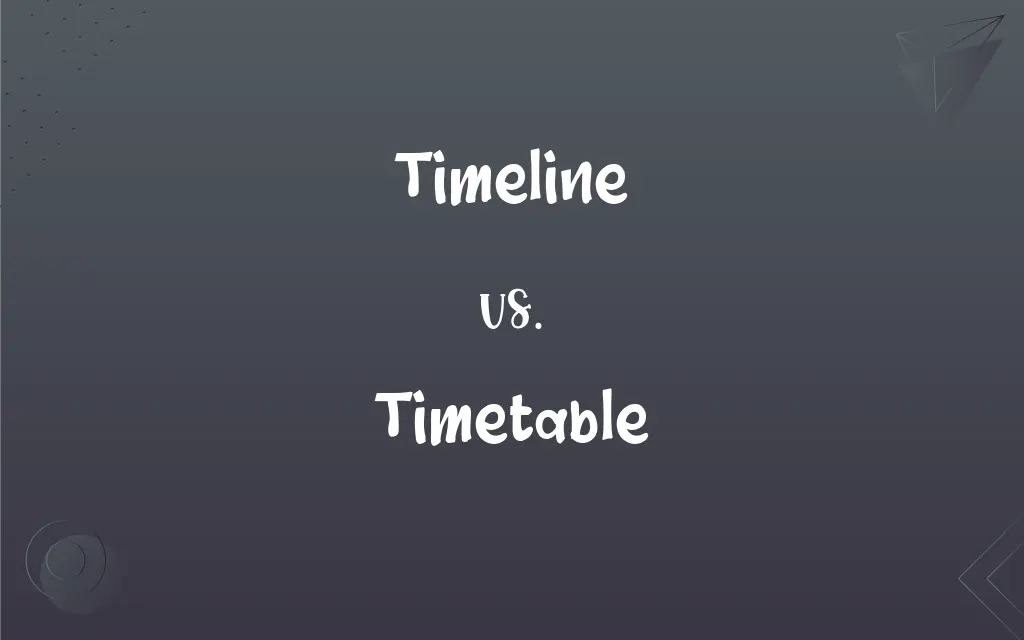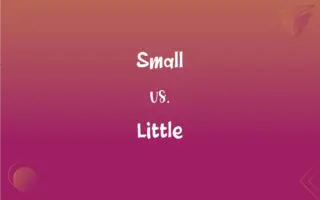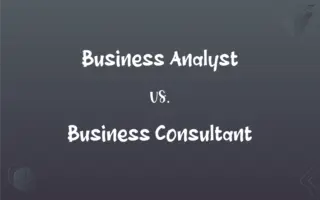Timeline vs. Timetable: What's the Difference?
Edited by Aimie Carlson || By Janet White || Published on January 5, 2024
"Timeline" is a chronological representation of events, while "timetable" is a schedule outlining times at which events or activities occur.

Key Differences
A "timeline" provides a linear representation of events in chronological order, often used to visualize historical, project, or life events. In contrast, a "timetable" is a structured schedule that specifies times for certain activities, such as classes, meetings, or transport services. While timelines focus on the sequence of events over time, timetables emphasize specific times for planned activities.
In historical contexts, a "timeline" shows the progression of events over periods, aiding in understanding the sequence and context of historical developments. On the other hand, a "timetable" might be used in educational settings to outline class schedules. While timelines trace developments and help in visualizing the flow of time, timetables are practical tools for managing daily or weekly activities.
When managing projects, a "timeline" illustrates key milestones and phases, providing an overview of the project’s progression. A "timetable," however, would detail when specific tasks or meetings are to occur. Timelines are thus more about the chronological order of events, whereas timetables are about allocating specific times for specific activities.
In biographies, a "timeline" can depict significant events in a person's life, showing the chronological flow of their life story. Alternatively, a "timetable" could be used in transport contexts to list departure and arrival times of trains or buses. Timelines here offer a narrative structure, while timetables are about logistics and planning.
Digital applications use "timelines" to display a sequence of activities or posts, as seen in social media platforms. In contrast, "timetables" are integral to time management applications, helping users schedule their tasks and appointments. While both are organizational tools, timelines provide a historical or sequential perspective, and timetables focus on planning and organization.
ADVERTISEMENT
Comparison Chart
Definition
Chronological arrangement of events
Schedule with specific times for activities
Focus
Sequence and timing of events over time
Specific times for scheduled activities
Usage Contexts
History, project management, biographies
Education, transport, daily planning
Purpose
Visualizing historical or project progress
Organizing and planning activities
Structure
Linear or graphical representation
Tabular or list format
ADVERTISEMENT
Timeline and Timetable Definitions
Timeline
A chronological sequence of events on a particular subject.
The documentary featured a timeline of the civil rights movement.
Timetable
A schedule of the times of classes in a school.
Students received their new class timetable at the beginning of the semester.
Timeline
A graphical representation of a sequence of events in chronological order.
The museum's exhibition included a timeline of the war.
Timetable
A schedule showing the times at which particular events occur.
The conference organizer published the timetable for all sessions.
Timeline
A schedule of stages in a project's development.
The project manager updated the timeline to reflect the new deadlines.
Timetable
A plan of times at which events are intended to happen.
She checked the train timetable to plan her journey.
Timeline
A representation of historical events in chronological order.
The teacher used a timeline to illustrate the history of ancient civilizations.
Timetable
A chart showing the departure and arrival times of trains, buses, or planes.
The airport displayed an electronic timetable of flight departures.
Timeline
A line that shows important events in the order they happened.
She drew a timeline to understand the novel's plot better.
Timetable
A plan that lists the times when particular activities will happen.
He followed a strict timetable for his study sessions before exams.
Timeline
A schedule of activities or events; a timetable.
Timetable
A schedule listing the times at which certain events, such as arrivals and departures at a transportation station, are expected to take place.
Timeline
A chronology.
Timetable
A tabular schedule of events with the times at which they occur, especially times of arrivals and departures.
The timetable has been changed several times since it was first announced.
Timeline
A representation or exhibit of key events within a particular historical period, often consisting of illustrative visual material accompanied by written commentary, arranged chronologically.
Timetable
A schedule of arrivals and departures published in book or booklet form, or as a pamphlet, and available to travelers, either free or for a charge.
Timeline
A graphical representation of a chronological sequence of events (past or future); a chronology.
Timetable
(transitive) To arrange a specific time for (an event, a class, etc).
I've timetabled the meeting for Monday afternoon.
Timeline
A schedule of activities; a timetable.
Timetable
A schedule listing events and the times at which they will take place
Timeline
(scifi) An individual universe or reality, especially a parallel/alternate one in which events differ from actual history, or differ from the established canon of a fictional world.
Timetable
A schedule of times of arrivals and departures
Timeline
To analyse a sequence of events or activities.
Timeline
To display such a sequence graphically.
FAQs
What is a timeline?
A chronological representation of events.
What is a timetable?
A schedule outlining specific times for activities or events.
Is a timetable the same as a calendar?
No, a timetable is more specific about times, while a calendar shows days.
Do timelines help in understanding history?
Yes, they're useful for visualizing historical events in sequence.
Are timetables important in project management?
They can be, particularly for scheduling tasks and meetings.
Can timelines show future events?
Yes, especially in project planning.
Are timetables used in schools?
Yes, for scheduling classes and exams.
Do timelines have to be linear?
Mostly, but they can also be circular or nonlinear in some presentations.
Is a timeline always accurate?
It should be, but accuracy depends on the data used to create it.
Do timetables help in time management?
Yes, they're essential tools for organizing and planning time.
How detailed can a timeline be?
It can range from high-level overviews to detailed chronologies.
Are timetables only for transport services?
No, they're used in various settings like schools, conferences, and personal planning.
Are timelines used in social media?
Yes, to display a sequence of posts or activities.
Is a timetable useful for daily routines?
Absolutely, it's great for structuring daily activities and commitments.
Can a timeline include dates and times?
Yes, timelines can include both dates and times.
Can a timeline be interactive?
Yes, especially in digital formats.
Can timetables change frequently?
Yes, especially in transport and event planning.
Can timelines show cause and effect?
They can illustrate sequences that imply causality.
Do timetables require constant updates?
This depends on the context; some may need regular updates.
Can anyone create a timetable?
Yes, with the right information about the events to be scheduled.
About Author
Written by
Janet WhiteJanet White has been an esteemed writer and blogger for Difference Wiki. Holding a Master's degree in Science and Medical Journalism from the prestigious Boston University, she has consistently demonstrated her expertise and passion for her field. When she's not immersed in her work, Janet relishes her time exercising, delving into a good book, and cherishing moments with friends and family.
Edited by
Aimie CarlsonAimie Carlson, holding a master's degree in English literature, is a fervent English language enthusiast. She lends her writing talents to Difference Wiki, a prominent website that specializes in comparisons, offering readers insightful analyses that both captivate and inform.






































































